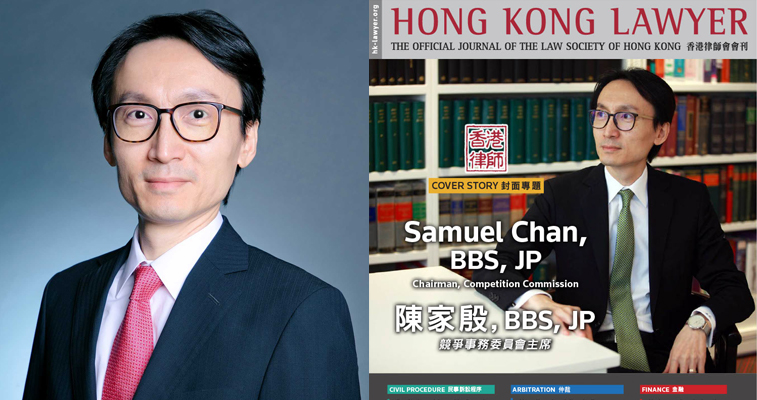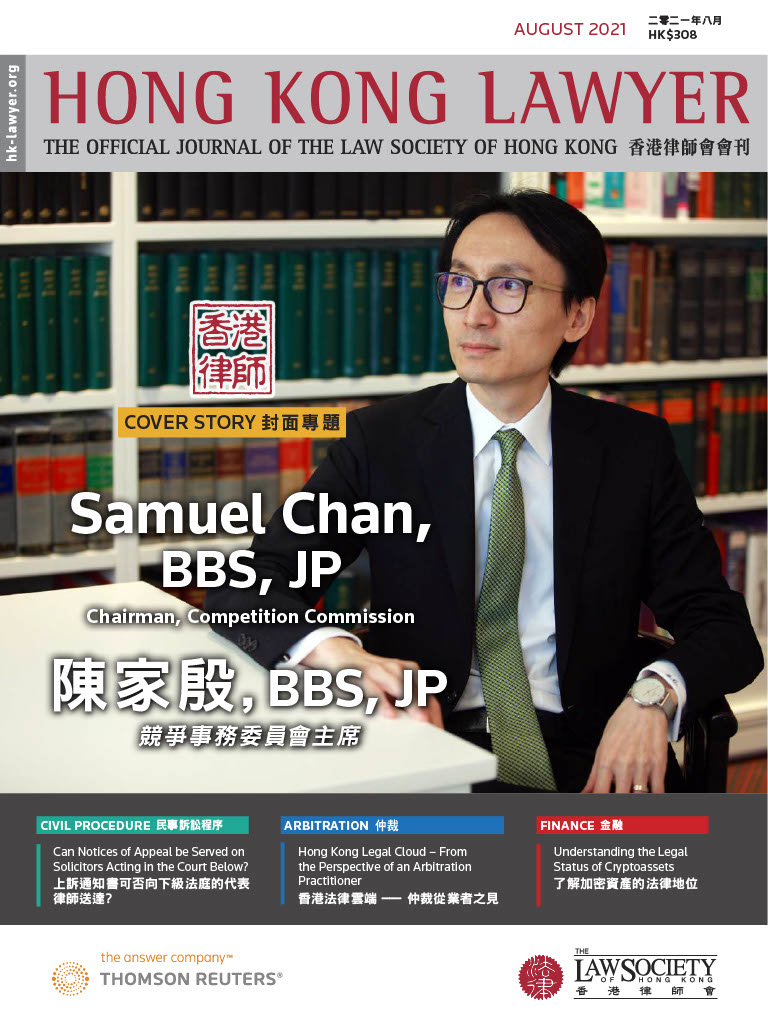
Samuel Chan featured as the cover story in the August edition of HK Lawyer
Samuel Chan, the Chairman of The Competition Commission (the Commission) has been at the helm of the independent statutory body established under the Competition Ordinance (Cap. 619) (the Ordinance) since May last year. His expertise in and passion for safe-guarding competitive behaviour for the benefit of different sectors of society including consumers, businesses, the Commission itself as well as Hong Kong as a city, is highly evident. While the Commission has plenty of achievements under its belt since its inception, Chan is insightfully aware of existing challenges and the work that is yet to be done.
A Suitable Choice
Born and educated in Hong Kong, Chan knew from a young age what he wanted to pursue as a career. Well before he pursued his legal education, his quiet disposition and fondness for doing his own research and analysis led him onto the pathway to becoming a barrister. Chan has had a decorated career since then, with several roles as a board member of various statutory bodies including the Insurance Authority and the Equal Opportunities Commission and more notably as the Vice-Chairman of the Consumer Council and now, as Chairman of the Competition Commission.
Chan believes his long-time involvement with the Consumer Council is an asset to his role as the Chairman of the Commission. “I had the privilege of serving the Consumer Council for around fifteen years and consumer interests are still very close to my heart,” he shares. “In my time with the Council’s Legal Protection Committee, I dealt with lots of issues concerning consumer interests such as auto-fuel prices, money lending issues and malpractices in different trades such as beauty parlours and gyms. I think my consumer interest background is what led the government to consider me the right person to chair the Commission,” he explains.
Given that anti-competitive behaviour poses very tangible hindrances for consumers, it is of no surprise that Chan still maintains his affinity for consumers in his current work. Out of the seven cases brought in front of the Competition Tribunal since he joined, the two that he is most personally fulfilled by are those that affected more vulnerable consumers. “The housing decoration cases where 10 contractors were fined for market sharing and price fixing on decorating public housing flats affected a vulnerable sector of society and I am glad we received a favourable outcome from the Tribunal,” he shares. Similarly, another case that is yet to be heard concerns anti-competitive behaviour amongst textbook publishers and retailers. “This is something that is naturally affecting a lot of consumers and families in Hong Kong. I am glad we could bring the case to the Tribunal and whether we obtain any favourable outcome is yet to be seen,” he shares.
Chan’s work with the Consumer Council also shaped his desire to participate in a public body which has sizable enforcement power. “When I was with the Consumer Council, I always heard people say that the Council is a toothless tiger. When I joined the Commission, I naturally would expect more opportunities to fight the big tigers, but it is equally important to be a part of and help build a relevant and credible public body that helps achieve a more level playing field for consumers and businesses in Hong Kong,” he adds.
Therefore, when Chan was appointed Chairman, building on the solid foundation laid by his predecessor, fellow commission members and the executive arm, he made it his goal that the “Commission should become a relevant and credible public body in the eyes of the people in Hong Kong” and that it should “receive the same if not higher level of recognition not only from the international community but also from consumers and businesses in Hong Kong.”
Commission’s Highlights
When assessing the progress of his goal for the Commission so far, Chan believes his team has a lot to be proud of. “I have told my executive staff on many occasions that they should be very proud of what they have achieved for the good name of the Commission over the past five years or so,” he shares. Both on an international front and in terms of local work, the Commission has experienced solid achievements and wins.
Internationally, the Commission has been an active member of the International Competition Network (ICN) – one of the largest international networks of competition authorities in the world, and in 2018, the Commission became Co-Chair of the Advocacy Working Group of the network. “The Commission has, thanks to the hard work of our team, earned wide and very positive recognition amongst fellow competition agencies in the world,” shares Chan. “We have obtained stellar awards internationally for our advocacy work and are among the top few jurisdictions in terms of the number of times we have won the competition advocacy contests organised by the ICN and the World Bank Group,” he adds.
In terms of local work, Chan is also very pleased with what the Commission’s executive arm has achieved over the past year. In December 2020, the Commission brought its very first case on abuse of substantial market power to the Competition Tribunal, demonstrating the Commission’s commitment to enforcing the full spectrum of the Ordinance. In May 2020, the Commission obtained for the first time, under section 60 of the Ordinance, commitments from three major online travel agents (OTAs) including Booking.com, Expedia.com and Trip.com. “The commitments from these OTAs were to address the Commission’s concerns due to the existence of wide parity clauses in the contracts between the OTAs and the accommodation providers in the city. These clauses would require accommodation providers to always offer the same or even better terms as they are offering to other sales channels,” explains Chan.
Another highlight would be the outcome of the Commission’s investigation of the Hong Kong Seaport Alliance. The formation of the Alliance, which is a contractual joint venture between a number of major container terminal operators, led the Commission to investigate whether the it may constitute a contravention of the First Conduct Rule of the Ordinance by harming competition in Hong Kong. Similar to the OTAs case, the Commission accepted commitments from the container terminal operators involved in the case. “The commitments took effect in October 2020 and will last for eight years, until 2028. This was a highly complex investigation involving major market players and its successful conclusion speaks volumes about the expertise, competence and professionalism of our legal and operations divisions,” shares Chan.
Unlike other organisations and public bodies, the Commission has not experienced any significant interruptions in its operation due to the pandemic. “On the contrary, because of the pandemic, we have tried other means to continue our work, especially our advocacy work and our interaction with fellow agencies around the world through online webinars and training courses,” he shares.
Despite a range of commendable highlights and milestones, Chan believes the Commission is still a relatively young agency with plenty to learn and a lot more to achieve.
Work in Progress
Under the Ordinance, there are several statutory functions the Commission is supposed to discharge. Those functions, amongst others, include – “the duty to promote research into and the development of skills in relation to the legal aspects of competition law in Hong Kong,” as well as “the duty to promote public understanding of the value of competition and how the Ordinance promotes competition,” explains Chan.
As far as the legal aspect is concerned, while the local competition law regime is largely modelled on European Law jurisprudence, Chan believes the extent to which the local courts are prepared to adopt the same jurisprudential approach as EU courts, is something that is yet to be seen. “A good example is the standard of proof,” he explains. “The Competition Tribunal has ruled that in proceedings for pecuniary penalties, the criminal standard of proof is applicable.
The Court of Appeal has declined to determine this issue until an appropriate occasion arises which naturally gives rise to certain challenges from an enforcement perspective,” he adds. “I should however emphasise that this does not in any way mean that our hands are tied when it comes to enforcement work, it is far from that. In fact, as demonstrated in the Nutanix case, we won the case despite the requirement of a higher standard of proof,” he shares. “However, unless and until the law in this regard is settled, the Commission, as the responsible law enforcement agency, must be vigilant and conscientious about the type of cases that are suitable to be brought to the Tribunal,” he adds.
Besides the standard of proof, other basic aspects of competition law which Chan believes need to become more firmly established include parental liability and the way pecuniary penalties should be imposed. “Over the next few years, as more and more cases are brought to the Tribunal and to the appellate courts, these aspects of competition law which are taken for granted in other jurisdictions will become more settled in Hong Kong,” he shares.
Chan understands that these challenges are due to the fact that the competition law regime is still relatively young in the city. One more challenge that arises because of this is executing another statutory function – “the duty to promote public understanding of the value of competition and how the Ordinance promotes competition.” Chan believes people in the city hold various misconceptions about competition law policy and the role of the Commission, which have not been the easiest to dispel. “One example is parallel pricing versus price fixing. Generally, people have had a lot of difficulty in understanding that parallel pricing is not the same as price fixing. As a matter of established competition law principles, the mere fact that competitors of different undertakings and businesses are offering goods or services at the same or very similar prices per se is not solid evidence of price fixing. In 1999, the Organisation for Economic Co-operation and Development (OECD) even reiterated this point in one of their roundtable papers – price parallelism is not the same as price fixing,” he explains.
Another misconception is that the Commission is supposed to be the price regulator. “The Ordinance does not seek to regulate prices,” explains Chan. “It was never the role of the Commission to make sure that the prices are “fair”,” he adds. “What competition law, and thus the Commission seeks to protect, is the process of competition, not the competitors in the boxing ring. Competition law believes that as long as the process of competition is in order, consumers will be able to enjoy better prices, wider choice of goods and better services in the long run,” he explains.
Chan is hopeful that by continuing their advocacy and public education work, the Commission will be able to dispel these common myths and promote a more accurate understanding of competition law and the Commission’s work.
Besides promoting a better understanding of competition law and policies and the Commission’s role, Chan is also keen on issuing more guidance on the various non-litigation measures that can be utilised to address competition concerns. “Quite apart from the litigation remedies and bringing cases to the Tribunal, there are other non-litigation measures under the Ordinance and different enforcement tools that can be used, such as the acceptance of commitments, issue of infringement notices and warning notices,” he explains. “Over the past year, we have managed to address several competition concerns by accepting commitments from major players in the market. We are now planning to issue more guidance for both the legal profession and the business community on commitments so that this non-litigation enforcement tool may be put to wider use,” he adds. “We believe using non-litigation measures will be, where appropriate, beneficial for both the Commission and the undertakings in an investigation,” he shares.
Lawyers and the Commission
Chan believes lawyers are crucial in helping promote a more comprehensive understanding of competition law and policies. “I would encourage lawyers to familiarise themselves first with competition law, even if competition law may not be one of their areas of practice,” he shares. The Commission has offered a series of training for lawyers who may not have expertise in this area and Chan is pleased so far with the turn out rate.
Another message he wishes to send across to lawyers is that they should encourage their clients to take advantage of “The Leniency Policy for Undertakings Engaged in Cartel Conduct”. Under the policy, the Commission would not bring proceedings against the first cartel member or the first undertaking that comes clean and is willing to cooperate and comply with the conditions under the policy. Chan believes the policy is a very important aspect of the work of any competition authority and since cartel conduct is notoriously difficult to detect, the Commission would gladly offer immunity to any insider who comes forward. Chan also explains that both the lawyer and the client have the option to ascertain whether they can benefit from the policy on an anonymous basis first.
Chan also encourages lawyers to guide their clients towards putting competition compliance programs in place within their businesses. The Commission plans to offer further guidance and training programs in this regard.
This article originally appeared in the August 2021 edition of Hong Kong Lawyer.
| Samuel Chan
|
 Samuel was called to the Bar in 1989 and holds considerable experience in a wide range of commercial, company, and chancery litigation matters. He is also actively involved in public services. Samuel was appointed Chairman of the Competition Commission in May 2020 and was former Vice-Chairman of the Consumer Council. Samuel also serves other advisory and statutory bodies, including the Insurance Authority and Town Planning Appeal Board. In 2020, Samuel was also awarded the Bronze Bauhinia Star by the Hong Kong SAR Government in recognition of his significant contribution to the promotion of consumer interests. Samuel’s profile can be found here. |
